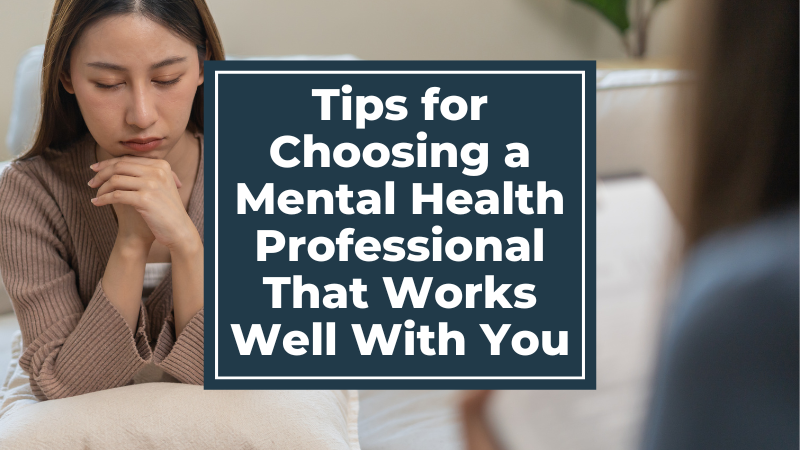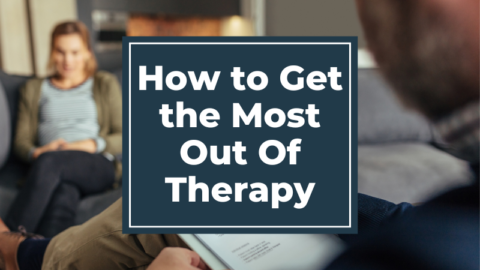Choosing a mental health professional is an important decision that can greatly impact your well-being and journey toward healing. Whether you’re seeking therapy, counseling, or other mental health services, finding the right professional who understands your unique needs and makes you feel comfortable is crucial.
Finding the right mental health professional is a highly individualized process. What works for one person may not necessarily work for another. It’s important to prioritize your needs, preferences, and goals throughout the selection process. By taking the time to find a mental health professional who aligns with your unique requirements, you can embark on a therapeutic journey that is supportive, empowering, and transformative.
I always advise my friends and family members to initially make appointments with at least two different professionals and decide which one I like best. Remember, you don’t have to stick with the first mental health professional you see. If you don’t like their style, don’t feel comfortable with them, or your personality just doesn’t click, it’s okay to find another professional you feel more comfortable with.
Why Is It Important to Find a Mental Health Professional You Like and Are Comfortable With?
Finding a mental health professional you like and are comfortable with is of utmost importance when seeking therapy. The therapeutic relationship is the cornerstone of effective treatment, and a strong connection between you and your therapist can greatly enhance the therapeutic process. There are several compelling reasons why it is crucial to find a mental health professional you connect with.
First and foremost, establishing trust is paramount in therapy. To feel safe and secure enough to share your innermost thoughts, feelings, and concerns, you need to have confidence in your therapist’s competence and integrity. Trust is built over time through open and honest communication, empathy, and a non-judgmental attitude. When trust exists, you can feel more comfortable discussing sensitive topics and exploring deeper aspects of yourself, which is essential for personal growth and healing.
Effective communication is another critical factor in therapy. Being able to openly express yourself and being heard and understood by your therapist is vital for the therapeutic process. When you feel comfortable with your mental health professional, you are more likely to communicate honestly and authentically. This enables your therapist to gain a deeper understanding of your unique experiences, challenges, and goals, leading to more tailored and effective treatment interventions.
A positive therapeutic relationship also promotes collaboration and empowerment. Therapy is a collaborative journey where you and your therapist work together toward your mental health goals. Feeling a sense of partnership and shared decision-making allows you to actively participate in your treatment. Your therapist can provide guidance, support, and expertise, while also honoring your preferences, values, and individual needs. When you have a voice in your treatment, you are more likely to take ownership of your well-being and feel motivated to make positive changes.
Emotional support is another significant aspect of the therapeutic relationship. Dealing with mental health issues can be challenging and emotionally taxing. Having a mental health professional who is empathetic, supportive, and understanding can provide immense comfort and reassurance. Feeling that your therapist genuinely cares about your well-being can foster a sense of safety, validation, and acceptance. This emotional support can be instrumental in building resilience, coping with difficulties, and fostering overall well-being.
Lastly, finding a mental health professional you like and are comfortable with increases the likelihood of receiving personalized treatment. Each person’s therapy needs are unique, and it is essential to work with a therapist who can tailor their approach to align with your specific preferences, cultural background, and individual circumstances. A therapist who understands and respects your values and beliefs can provide a treatment plan that feels relevant, meaningful, and effective. This personalized approach enhances the therapeutic experience and increases the chances of achieving positive outcomes.
Trust, effective communication, collaboration, emotional support, and personalized treatment are some of the key benefits of a positive therapeutic relationship. Investing time and effort into finding the right mental health professional can significantly contribute to your overall therapy experience and increase the likelihood of positive change and growth. Remember, therapy is a journey, and having a supportive and compatible therapist by your side can make a world of difference in your healing process.
Tips for Choosing The Best Mental Health Professional For You
Choosing a mental health professional who is the right fit for you is essential for effective treatment and support. Here are some tips to consider when selecting a mental health professional:
- Research and gather information: Take the time to research different mental health professionals in your area. Look for their qualifications, specialties, and areas of expertise. Read reviews or testimonials to get an idea of their approach and how they work with clients.
- Seek referrals and recommendations: Ask trusted friends, family members, or healthcare providers for recommendations. They may have had positive experiences with mental health professionals and can provide valuable insights.
- Consider your specific needs: Consider what type of support or treatment you are seeking and any specific concerns or goals you have. Some mental health professionals specialize in certain areas, such as anxiety, depression, trauma, or addiction. Choose a professional who has experience and expertise in addressing your specific needs.
- Check credentials and licenses: Ensure that the mental health professional you are considering is licensed and accredited. Check their credentials and verify their qualifications through professional licensing boards or associations.
- Contact and interview potential professionals: Before making a decision, contact the professionals you are interested in and schedule initial consultations or phone calls. Use this opportunity to ask questions, discuss your concerns, and assess if you feel comfortable and supported by their approach and communication style.
- Trust your instincts: During your first meeting or initial consultation, pay attention to your gut feelings and overall comfort level with the mental health professional. Trust is an essential component of the therapeutic relationship, so it’s important to feel a sense of trust and rapport with the person you choose. If you don’t feel a connection or comfortable with a particular professional, it may be worth exploring other options.
- Consider the therapeutic approach: Different mental health professionals may utilize various therapeutic approaches or modalities. Research different approaches and consider which ones resonate with you or align with your preferred style of therapy. For example, if you prefer a more structured approach, you may opt for cognitive-behavioral therapy (CBT), while if you’re interested in exploring deeper emotions, you may choose psychodynamic therapy.
- Assess their availability and logistics: Consider practical factors such as the professional’s availability, location, and scheduling options. Determine if their office hours align with your availability and if they offer flexible appointment options that accommodate your needs.
- Seek cultural competence: If you have specific cultural or identity-related considerations, look for a mental health professional who demonstrates cultural competence. They should have an understanding and respect for diverse backgrounds and be able to provide inclusive and sensitive care.
- Insurance coverage and affordability: If you have health insurance, check if the mental health professional accepts your insurance plan. Inquire about fees and payment options, as well as any sliding scale or reduced-cost options they may offer. It’s important to find a professional whose services are within your financial means.
- Seek a collaborative and empowering approach: Look for a mental health professional who emphasizes collaboration and empowerment in the therapeutic process. A good therapist or counselor should work with you as a team, respecting your autonomy and involving you in decisions regarding your treatment goals and plans.
- Consider their flexibility and adaptability: Look for a mental health professional who is open to adapting their approach to meet your specific needs and preferences. They should be willing to listen to your feedback, adjust their strategies if necessary, and be flexible in their therapeutic approach.
- Trust your own judgment: Ultimately, trust yourself and your judgment when choosing a mental health professional. Your intuition and instincts can often guide you toward the right fit. If you don’t feel comfortable or if something doesn’t feel right, it’s important to explore other options until you find the right match.
Remember, finding the right mental health professional may involve some trial and error. Don’t be discouraged if it takes a few attempts to find the right fit. The therapeutic relationship is crucial, and working with a professional who understands and supports you can greatly enhance the effectiveness of your treatment.
What Should I Do If I Don’t Like My Therapist Or Mental Health Professional?
If you find that you don’t like your therapist or mental health professional, it’s important to address the situation rather than continuing with a therapeutic relationship that is not serving your needs. Here are some steps you can take if you find yourself in this situation:
- Reflect on your feelings: Take some time to reflect on why you don’t feel a connection or compatibility with your therapist. Is it a matter of personal chemistry? Do you feel unheard or misunderstood? Are there any specific behaviors or communication styles that bother you? Understanding your feelings can help you articulate your concerns more effectively.
- Communicate your concerns: It’s essential to openly communicate your concerns with your therapist. Schedule a session specifically to discuss your feelings and experiences in the therapeutic relationship. Be honest and specific about what isn’t working for you and how you believe the therapeutic process could be improved. A good therapist will be receptive to your feedback and open to addressing any issues that arise.
- Seek a second opinion: If you’re unsure whether your feelings are warranted or if you’re not confident in your ability to address the situation with your therapist, consider seeking a second opinion. Consult with another mental health professional to gain a different perspective. They can provide insights into whether your concerns are valid and offer guidance on the next steps.
- Explore other options: If after discussing your concerns with your therapist or seeking a second opinion, you still feel that the therapeutic relationship is not beneficial, it may be time to consider other options. You can explore finding a new therapist or mental health professional who may be a better fit for your needs and preferences. It’s important not to give up on therapy altogether just because you didn’t connect with one provider.
- Advocate for yourself: Remember that you have the right to receive effective and appropriate mental health care. If you’re not satisfied with your current therapist, don’t hesitate to advocate for yourself. Reach out to mental health organizations, professional associations, or community resources for guidance and support. They can provide recommendations for other professionals or offer resources to help you navigate the process of finding a new therapist.
Remember that the therapeutic relationship is a significant factor in the success of therapy. If you don’t feel comfortable, understood, or supported by your therapist, it can impede your progress. It’s important to prioritize your well-being and find a mental health professional who aligns with your needs and can provide the support you require on your healing journey.
To Sum Up: How to Choose a Good Therapist
Choosing a mental health professional is a significant step towards improving your mental well-being and finding support on your journey. It’s a decision that should be approached with care and consideration, as finding the right professional can greatly impact the success of your therapeutic experience. In this blog, we have discussed various tips and considerations to help you make an informed choice.
Remember that finding the right mental health professional is a personal process. It’s essential to prioritize your needs, preferences, and comfort when selecting someone to work with. Take the time to research different professionals, understand their specialties and approaches, and assess their qualifications and credentials. Pay attention to the therapeutic relationship, as it forms the foundation of effective therapy. Feeling comfortable, understood, and supported by your mental health professional is crucial.
Additionally, consider practical factors such as cost, accessibility, and availability. These aspects can play a role in your ability to maintain regular therapy sessions and create a sustainable treatment plan.
Ultimately, trust your instincts and listen to your gut feeling when choosing a mental health professional. If you find that a particular professional is not the right fit for you, don’t hesitate to explore other options. It’s essential to feel empowered and supported in your therapeutic journey.
Seeking help and support from a mental health professional is a courageous and proactive step toward self-care. By finding a mental health professional who resonates with your needs and goals, you can embark on a transformative journey toward personal growth, healing, and well-being.
Remember, you don’t have to navigate this process alone. Reach out to trusted friends, family members, or healthcare professionals for guidance and support. Together, you can find the mental health professional who will provide the support and understanding you deserve.
Take your time, be patient with yourself, and trust that the right mental health professional is out there for you.
If you’d like to discuss maladaptive daydreaming with other maladaptive daydreamers, consider joining the Maladaptive Daydreaming Forum.









